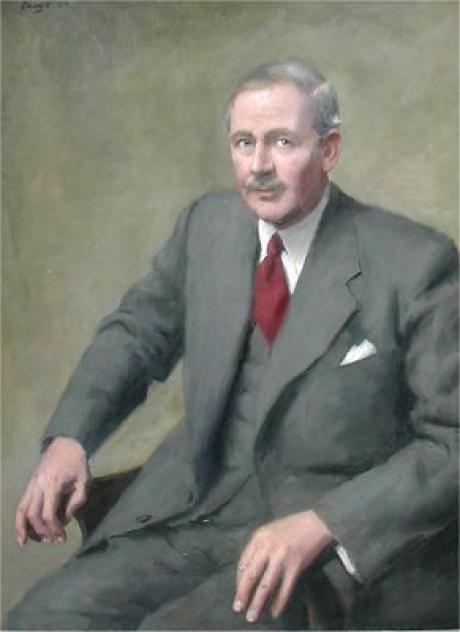signed and dated "1953"
Sir (Francis Guy) Clavering Fison (1892–1985), also educated at Charterhouse and Christ Church, had intended a career in medicine, before being called up in the Suffolk yeomanry and then transferring to the Royal Air Force Training Corps for officers. Reluctantly he joined the family business, in 1920, and he quickly became effectively the managing director. As the inter-war recession took hold he ruthlessly cut costs, in 1923 closing the fertilizer plant at Bramford and buying superphosphates from the Netherlands; he also sold the flour-milling business. By the late 1920s he was convinced of the need to rationalize the whole industry, and in 1929 Joseph Fison & Co., Packard and James Fison (Thetford) Ltd, and Prentice Brothers of Stowmarket merged to form Fison, Packard, and Prentice, bringing together firms that, with the exception of Packards, had very close family links. Recognizing the threat from the newly formed Imperial Chemical Industries (ICI), Clavering began rapidly to expand the business by buying up small fertilizer concerns throughout the United Kingdom; he supervised the take-over of thirty-two concerns between 1929 and 1945. His skill in making acquisitions earned him the sobriquet in the trade of the Wise Man of the East. The manufacturing base of the company was strengthened with the construction of new factories at Ipswich and Avonmouth. In 1937 Clavering took the important decision to build a synthetic-nitrogen plant at Flixborough, near Scunthorpe, to make the company independent of ICI for the supplies of nitrogen. By 1939 Fisons was supplying some 30 per cent of the UK fertilizer market. In 1942 the group was renamed simply Fisons.
Although fertilizers continued to dominate Fisons' business, the take-over of the Anglo-Continental Guano Works Ltd in 1937 had brought with it Genatosan Ltd of Loughborough, a manufacturer of drugs, pharmaceuticals, fine chemicals, and scientific apparatus. After the Second World War, Clavering Fison fostered diversification of the company into these areas, setting up a chemical and biological division. In 1947 Genatosan was merged with Bengers Ltd, and the following year Gland Suppliers was absorbed. Clavering also placed emphasis on product development, and in 1945 began a research and development department; in 1953 Pest Control Ltd was purchased and the Levington research station was established outside Ipswich. In 1957 Clavering retired as chairman, becoming life president, and received a knighthood for his service to agriculture. In that year the sales of the Fisons group totalled £54,512,000, on which the profit before tax was £2,710,000. Clavering was succeeded as chairman by Jim Turner, Lord Netherthorpe.
Sir Clavering Fison's style of management during his forty years at the helm had become increasingly autocratic as he won the respect of the fertilizer industry. He had a flair for choosing businesses to buy and had the temperament and judgement to push through a policy of rationalization. He also chose his lieutenants wisely, attracting men whose administrative and technical skills could weld the companies he had purchased into a successful group. Although he saw the need to diversify after the war, his ventures in pharmaceuticals and scientific instruments provided only the foundations for later developments.
Apart from his business activities Sir Clavering farmed 400 acres at Stutton Park, Suffolk, which gave him first-hand knowledge of the customers' side of the fertilizer business. A lifelong Conservative, he was elected MP for Woodbridge in 1929, but he resigned in 1931 owing to pressure of work. He stood again in 1945, but was defeated in the Labour landslide. He was a keen shot and salmon fisher, and an outstanding tennis player, competing at Wimbledon in 1914 and 1920. On 23 February 1922 he married Evelyn Alice Mary (1901/2–1985), daughter of Francis Lawrence Bland and a great-niece of Elizabeth Fry. They had two daughters. Sir Clavering Fison died on 13 April 1985, and his wife died a few weeks later.
Such an enduring network of family enterprise, spanning two centuries and a variety of products, is not uncommon; but only rarely has it reached such a pinnacle of achievement.
Michael S. Moss DNB

